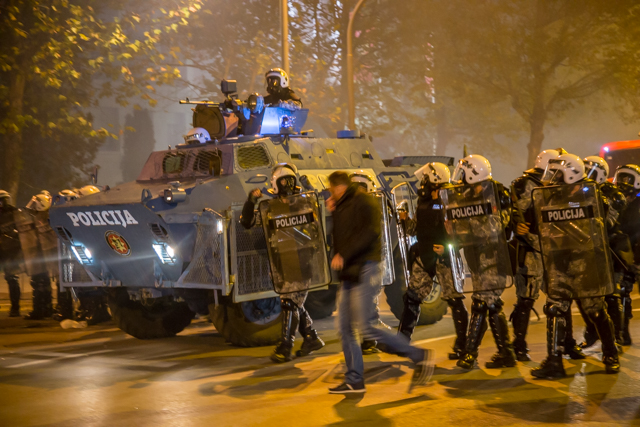
Russia’s Involvement in the Western Balkans Amplifies Intraregional Instability
Publication: Eurasia Daily Monitor Volume: 12 Issue: 208
By:

For the second time in the past twelve months, German Chancellor Angela Merkel has voiced concerns about the long-term stability of the Western Balkans. Her first claim, made in November 2014, referred to Russia’s potential neo-imperial appetite in the region following the annexation of Crimea and continuing war in Ukraine (Mapo.al, November 19, 2014). She expressed a second warning recently, while speaking to her party’s members, on November 3, indicating that the current European refugee crisis could rekindle tensions between the Balkan region’s governments and lead to potential armed conflicts if Germany closes its borders (Shqiptaria.com, November 3). Though her recent comments triggered a wide discussion in the regional media, most treated Merkel’s warnings with skepticism, maintaining they exaggerate the actual repercussions the refugee crisis could have for the Western Balkans (Fax.al, November 4).
Yet, such quick dismissals of the German leader’s remarks may be short-sighted. In addition to rising intra-regional tensions linked to cross-border flows of refugees attempting to reach northern Europe, the increasing presence of corruption, organized crime, and unresolved territorial and ethnic disputes across the Balkans are becoming ever more acute. Furthermore, these countries’ European ambitions and integration processes are similarly being restrained by extra-regional challenges, such as the rise of religious radicalism and far-right rhetoric. And all of those obstacles—both internal and external—are increasingly being exacerbated by Russia, which uses targeted economic investments, political pressure and the promise of military-sector cooperation to push the region into a geopolitical limbo, uncertain of its future path.
In a recent visit to Moscow on October 25, Serbian Prime Minister Alexander Vučić underscored Russia’s important economic investments in Serbia’s strategic infrastructure and in its energy sector (Lajmi.net, October 25). Notably, Gazprom owns a large stake in the country’s natural gas suppliers, whereas Lukoil owns almost 80 percent of oil retailer and trader Beopetrol since 2003 (Voice of Russia, December 18, 2013). Both sides stressed that such economic investments were the key to a series of bilateral agreements signed between the two countries. But Vučić’s three-day visit to Moscow was also crucial to the expansion of Russia’s military support toward Serbia. In particular, the two sides signed a deal for purchases worth over $2.5 billion in Russian armaments (Mapo.al, November 3). Few details were released to the media regarding the deal, but military experts in Belgrade were quick to deny that these arms sales would cause any diplomatic friction between Serbia and the European Union. “There’s no need to think that we will worsen our relations with the EU, because Serbia cooperates with NATO [the North Atlantic Treaty Organization] a lot more than it does with Russia when it comes to military drills, equipment and things like that,” Belgrade-based military expert Alexander Radic told Balkan Insight, a local news website (Balkan Insight, October 27).
Nevertheless, analyses and reports from other regional outlets have expressed serious concerns that these arms purchases could have serious negative implications for the long-term stability of the region and for Serbia’s EU integration (B92, October 30). The purchased Russian armaments will reportedly be stationed at a military base near the Presovo valley, in southern Serbia—an area with a predominantly ethnic-Albanian population, located only a few kilometers away from Bonsteel, the United States’ remaining military base in Kosovo (Mapo.al, November 3).
Meanwhile, as other countries in the region have continued to advance their EU and NATO membership ambitions, Russia has been increasing its pressure to disrupt these moves. To date, Croatia and Slovenia are the only Western Balkan countries to have joined the EU and (with Albania) NATO. By the end of this year, NATO members will collectively decide on whether to offer an invitation for Montenegro to join the Alliance; and the extension of membership to Podgorica will likely be met by angry public rebukes by officials in Moscow (Nato.int, October 26; RFE/RL, June 12, 2014).
Russia’s economic presence in this small, predominant Slavic, Christian Orthodox country has grown significantly in the past several years, currently amounting to over 5 percent of Montenegro’s GDP. Over 7,000 Russian nationals are permanent residents in Montenegro, and Russians own an estimated 30 percent of local firms as well as 40 percent of Montenegro’s real estate, mainly along the Adriatic coast (Balkan Insight, April 24, 2014). But according to Russian media reports, Russia’s investments there are threatened because EU-aspirant Montenegro had joined European sanction against Russia and its prime minister, Milo Đukanovic, has vowed to “clean the country of the remnants of Russian influence” (Rg.ru, April 23, 2014).
Such moves have sparked serious diplomatic disputes between the two states, with Russia going as far as abolishing a visa-free regime and other bilateral trade agreements (Balkan Insight, April 24, 2014). Furthermore, this past October, a series of anti-government protests in Podgorica, demanding early elections and the formation of an interim government, turned violent. Prime Minister Đukanovic directly accused Russian and Serbian influence in mobilizing and organizing these demonstration. According to local reports, many of the protesters were carrying Serbian flags, but the leaders of the movement have repeatedly denied any ties to Moscow or Belgrade (Balkan Insight, October 24).
Several Western Balkan countries are wary of Russia’s support for local political elites who could disrupt the region’s long-term stability. These Russian protégés regularly oppose reforms to further EU integration as well as steps Balkan governments are taking to normalize relations with their neighbors. Belgrade, Moscow’s strongest regional ally, is also pursuing EU membership; but Russian actions could strongly influence the success or failure of Serbia’s accession process over the coming years.
All this is particularly dangerous in the Western Balkans, where territorial and ethnic disputes drive the majority of the inter- and intra-state conflicts. In recent months, growing internal divisions over territorial agreements have included political disputes over the creation of Serbian-majority municipalities in Kosovo as well as the possible dissolution of the Dayton Agreement in Bosnia-Herzegovina, which could allow the republic-level entity of Republika Srpska (Serb Republic) to secede. But as massive numbers of refugees from Syria and the wider Middle East continue to try to cross the Balkans on their journey to Western Europe, regional governments have spent more time trading insults and blocking borders instead of addressing the needs of those affected or focusing on the region’s larger conflicts and problems. In the Western Balkans, diplomatic rows can easily take on a religious or nationalist nuance, and the potential clash of these two opposing forces threaten to destabilize a fragile, but strategically placed area inside Europe.




